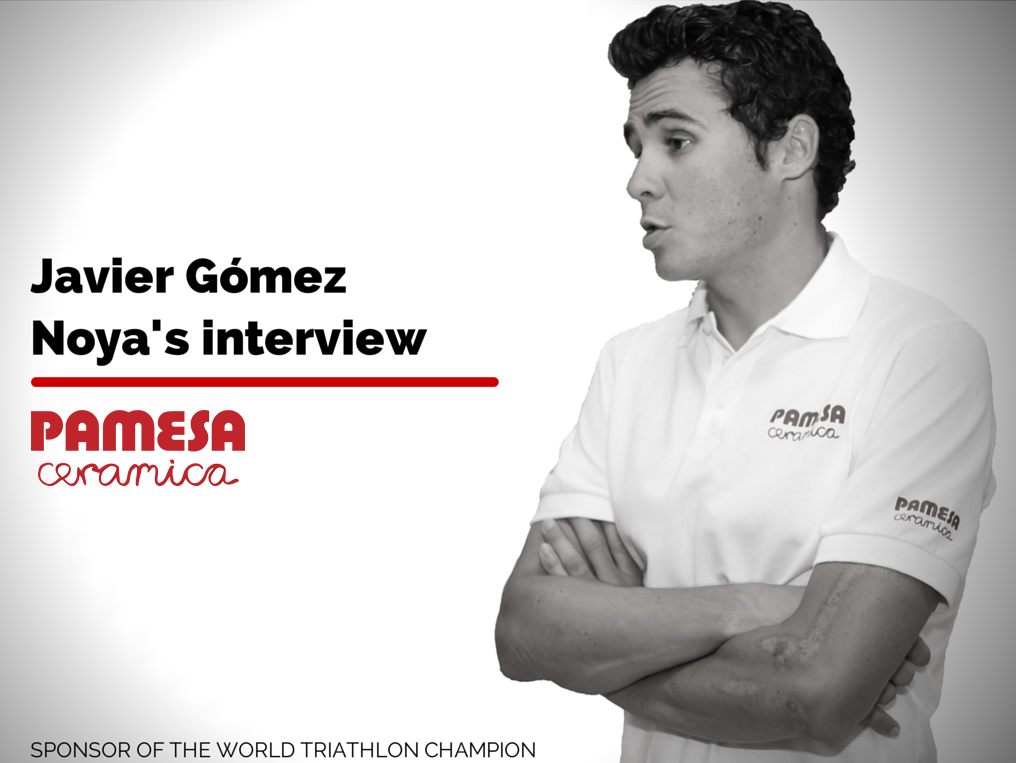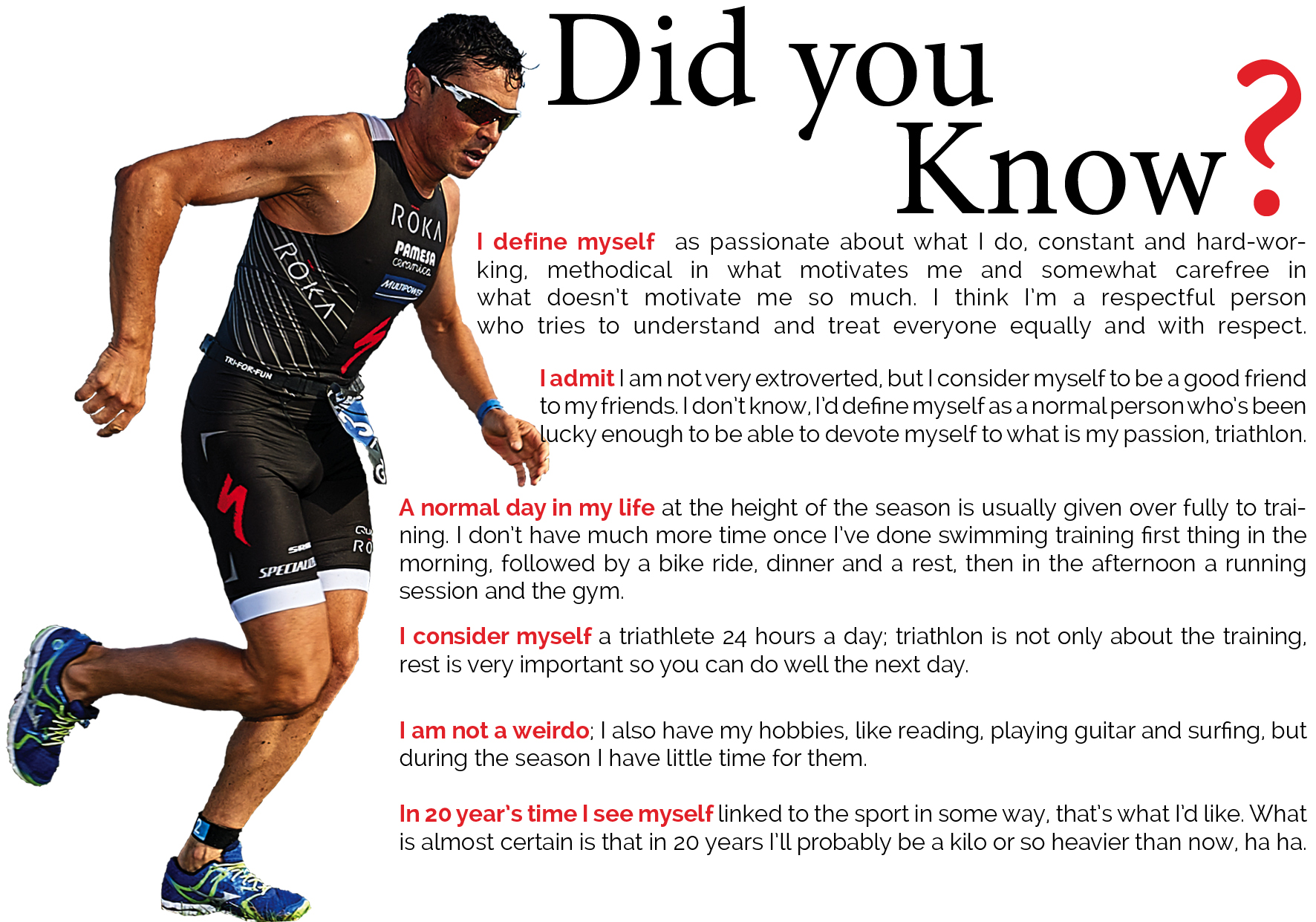His mental strength is his greatest tool. Disciplined, tenacious and methodical, Javier Gómez Noya is enjoying a highpoint in his sporting career.We interviewed him after being awarded as the best Spanish sportsperson of 2013. It is 17 years since he competed in his first triathlon, but not only is the triathlete just as enthusiastic as on the first day, he is the embodiment of passion for triathlon.
As well as the hours of hard training, his genetic make-up also stands him in great stead for beating records. Gómez Noya has talent: at 31 years old, his track record proves it. His name is associated with sporting success and since this season, with the only Spanish company to sponsor him, Pamesa Cerámica.
Question: What does it mean to you to have received the Don Felipe de Borbón Award in recognition as the best Spanish sportsperson of 2013?
Answer: For a long time I would never have imagined in my wildest dreams everything that I’ve achieved so far. It is very gratifying to have your work recognised with all these awards that you don’t win as a direct result of the competitions, so being awarded them is not directly in my control. I feel very happy for myself, but also for the sport of triathlon, because it means the media pays a little more attention to it, which is always a good and positive thing.
Q: Fourth World Championship, Half Ironman, Beijing, Barcelona Garmin, second at Nice… How do you rate this season?
A: I think this has been the best season of my career so far, as the victories you mention show, which are the results of hard work every day. There’s no doubt I’ve trained a lot, perhaps more than ever to get this far, so I’m very satisfied with my success and how I’ve achieved it. I have performed really well all year long.
Q: In addition, Pamesa Cerámica has become your sponsor this year…
A: Yes. It’s a great joy that Pamesa Cerámica has joined my sponsors and it takes the worry out of preparing for the Olympic Games, and enables me to grow as a professional. I feel a great responsibility to my sponsors for their commitment to me, so my victories are also due in part to them.
Q: What do you think of Pamesa Cerámica being your only Spanish sponsor?
A: On one hand, it saddens me to think that there is only one Spanish company that puts its trust in me. On the other hand and most importantly, I am hugely grateful and indebted to Pamesa, and especially because it isn’t a technical triathlon sports brand, which means I value it even more.
“The Pamesa sponsorship enables me to grow as a professional”
Q: What values have helped you to build up this sporting track record?
A: Triathlon is a very tough sport both physically and mentally. For this reason, without effort, perseverance and sacrifice I couldn’t have got this far. My journey to becoming first a professional and then world champion has not been easy; constant improvement has been the key.
Q: You mention constant improvement. How would you define this value?
A: I understand it as never giving up, however difficult a target may seem or the barriers that external factors put in your way. It also means not conforming and being willing to learn at all times; in my case it has meant adopting new ways of training and of competing.
Q: What is your strength in this sport?
A: I honestly believe my strong point is that I’m an all round triathlete in all three disciplines. I don’t have any really obvious weakness that my opponents can clearly take advantage of.
Q: How has coinciding with two of the best athletes in history, the Brownlee brothers, influenced you? Has it made you grow as an athlete?
A: It’s certain that the Brownlees have made me a better athlete. If they hadn’t been there I would probably have won more races, but having to compete against them has meant I have to give my absolute maximum to improve, study new training patterns, take risks to win … And the harder the goal is to achieve, the greater the satisfaction.
“The harder the goal is to achieve, the greater the satisfaction”
Q: What role does your mental strength play?
A: I think it’s probably the key factor that makes the difference between becoming a professional athlete or getting left behind, and from there being just one of the crowd or winning. Having said that, all this is based on having a natural physical and physiological talent to become an elite athlete. Not everyone can be, obviously.
Q: Which race have you felt most comfortable in?
A: The World Half Ironman was the most enjoyable race for me because I didn’t feel under too much pressure after I’d achieved my main target for the year, the ITU World Triathlon Series. And because it was a new race for me I enjoyed it a lot, in spite of not having prepared for it specifically.
Q: What was your first thought when you became champion for the fourth time?
A: The first thing I thought was that I had finally finished the race. The week before had been a little tense; it seemed I had nothing to win and a lot to lose because I had been leading the world series throughout the year. And on top of that, I couldn’t perform well in Stockholm because of physical problems, which made me start to wonder. But, having said that, there’s no doubt I felt extremely happy when I crossed the line.
Q: Rio is your next goal; do you feel ready to win the gold?
A: Rio is my short- and medium-term goal and if I didn’t consider myself capable of winning the gold, I honestly think I would focus on other goals or other competitions. There is still a year and a half before Rio and I think that if I manage to keep injuries at bay I’ll be ready to fight for the victory, but after that it will be the race itself that puts everybody in their place.
Q: How have you planned your training to achieve this victory?
A: I focus my training on trying to improve the running part, which is the deciding factor in winning the medals. So my work focuses on trying to lose a little weight, without it affecting my strength. However, we shouldn’t forget the other two disciplines, swimming and cycling, where the training will be tough too, since, although they are disciplines that probably won’t bring you victory, they can easily make you lose the race.
Q: In 2015 will we see you in the same competitions as this year?
A: I’ll most likely cut down on the number of competitions to concentrate on Rio because that’s important in the year before the Games. On the other hand, I’ll probably run the European as a priority target because it’s a day race like the Olympic Games, so I will use this competition as a test for Rio. As for the others, I think I’ll compete in the World Half Ironman and ITU, like in 2014.
Q: You’ve developed a lot as a sportsman. What’s left of the Gómez Noya who started out in triathlon?
A: The enthusiasm and passion for triathlon. Obviously now I am professional and I live off my sport, so I feel very lucky. However, triathlon is honestly a sport that fills me with excitement and I love it even more now than I did in my first competitions.
Q: What do you think of the triathlon boom in Spain?
A: It’s a good thing, obviously, for me because it means more people know about me and notice me and there is more interest from commercial brands. But honestly and most importantly, it shows that society is heading towards a culture of sport and wellbeing, which is very good for everyone. I think that taking part in triathlons helps all those who do it have a healthier life.
Q: What are your long-term personal and sporting dreams?
A: On a sporting level, the goal that motivates me most is the Kona Ironman and once the Olympic Games are over I’ll concentrate on that. On a personal level, I’d like to have children in a few years time.




